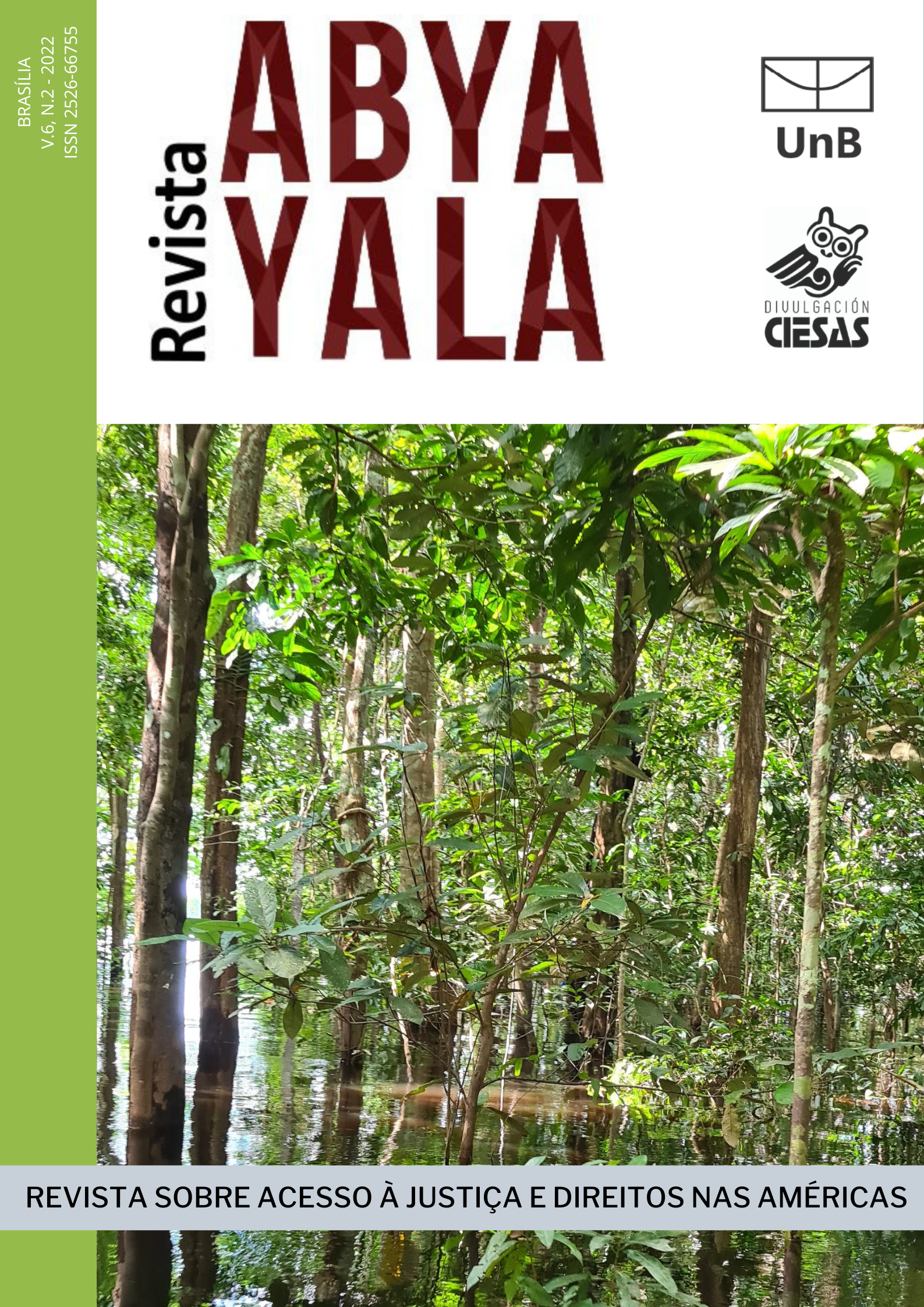THE "MONSTRUOUS CONDITION": THE CONSTRUCTION OF THE FORMAL CONCEPT OF CONSTITUENT POWER IN CONTEMPORANEITY AND ITS IMPLICATION IN FREEDOM AND SOCIAL JUSTICE
DOI:
https://doi.org/10.26512/abya-yala.v6i2.46205Keywords:
Constituent power,, conservative liberalism, nominalism, shared sovereignty, constituted constituent powerAbstract
The consolidation of the democratic constituent processes characteristic of
revolutionary liberalism from the end of the 18th century and the beginning of the 19th
century generated the conservative reaction of the social and economic forces that set
themselves the objective of stopping the emancipatory character of the constituent
power concept. Among these efforts stands out the deployment of the formal concept of
constituent power, conceived as a "monstrous condition" in terms of Donoso Cortés,
intended to chain the constituent power within the theoretical framework of legality and
exceptionality, which had a negative impact on progress of freedom and social justice.
Three creations stood out in the formal concept of constituent power: shared
sovereignty, nominalism of constitutional rights, and “constituted constituent power”.
The work critically analyzes these arguments that feed, even today, broad doctrinal
debates about the nature of the constituent power.
Downloads
References
Arendt, H., On revolution. Nueva York:Penguin Books, 2006. Edición en español: Sobre la revolución. Madrid:Alianza, 2013.
Bogdanor, V., “The monarchy and the constitution". Parliamentary Affairs, vol. 49, no. 3, July 1996, pp. 407-422.
Colón-Ríos, J., La constitución de la democracia. Bogotá:Universidad Externado de Colombia, 2013.
De la Torre del Río, R., El Congreso de Viena (1814-1815). Madrid: Los libros de la Catarata, 2015.
Dyson. K., Conservative liberalism, ordo-liberalism, and the State. Disciplining democracy and the market. Oxford: Oxford University Press, 2021.
Fernández Sarasola, I., “La influencia de Francia en los orígenes del constitucionalismo español (19 April 2005), en Forum historiae iuris, https://forhistiur.net2005-04-sarasola
García Pelayo, M., “Constitución y Derecho constitucional (Evolución y crisis de ambos conceptos)”. Revista de Estudios Políticos n. 37-38, 1948, pp. 53-122.
González Casanova, J.A., “La idea de Constitución en Karl Loewenstein”. Revista de Estudios Políticos nº 139, 1965, pp. 73-98.
Guadarrama, P., “Filosofía latinoamericana: momentos de su desarrollo”. Eikasia, Revista de Filosofía nº 17, 2008, pp. 1-45.
Hallett, B.F., El derecho del pueblo a establecer formas de gobierno. Pireo:Valencia, 2021.
Kalyvas, A. “Soberanía popular, democracia y el poder constituyente”. Política y Gobierno vol. XII, nº 1, 2005, pp. 91-124.
Lamparello, A. y Swann, C., The United States Supreme Court's Assault on the Constitution, Democracy, and the Rule of Law. Londres: Routledge, 2017.
Lassalle, F., Sobre la esencia de la Constitución. Traducción y estudio preliminar de Carlos Ruiz Miguel. Valencia: Pireo, 2021.
Loewenstein, K., “Constituciones y Derecho constitucional en Oriente y en Occidente”. Revista de Estudios Políticos nº 164, 1969, pp. 5-56.
Marshall Barberán, P., “La soberanía popular como fundamento del orden estatal y como principio constitucional”. Revista de Derecho de la Pontificia Universidad Católica de Valparaíso nº 35, 2010, pp. 245-286.
Martínez Dalmau, R., "El Estado social en Estados Unidos", en Noguera Fernández, Albert y Guamán Hernández, Adoración, Lecciones sobre el Estado Social y derechos sociales. Tirant, Valencia, 2014.
Martínez Dalmau, R., "El debate sobre la naturaleza del poder constituyente: elementos para una teoría de la Constitución democrática", en Martínez Dalmau, Rubén (ed.), Teoría y práctica del poder constituyente. Valencia:Tirant, 2014.
Martínez Dalmau, R., "Entre la confusión y el trastorno de identidad: un análisis crítico de los procedimientos de reforma en la Constitución de 1978", en Martín Cubas, Joaquín (coord.), Constitución, Política y Administración. España 2017, reflexiones para el debate. Valencia:Tirant, 2017.
Downloads
Published
How to Cite
Issue
Section
License
Copyright (c) 2023 Abya-Yala: Journal on Access to Justice and Rights in the Americas

This work is licensed under a Creative Commons Attribution-NonCommercial 4.0 International License.
The sending of contributions to Abya Yala implies the assignment of copyright and publication to the Journal, observing the Attribution-Non-Commercial 4.0 International (CC BY-NC 4.0) adopted.
The content of the texts submitted to and published by the journal will be the sole responsibility of their respective authors.
Copyright: https://creativecommons.org/licenses/by-nc/4.0/deed.en





